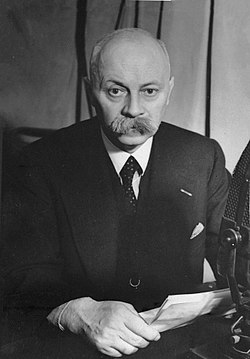Pieter Sjoerds Gerbrandy
|
His Excellency Pieter Sjoerds Gerbrandy |
|
|---|---|

Pieter Sjoerds Gerbrandy in 1941
|
|
| Prime Minister of the Netherlands | |
|
In office 3 September 1940 – 25 June 1945 |
|
| Monarch | Wilhelmina |
| Preceded by | Dirk Jan de Geer |
| Succeeded by | Willem Schermerhorn |
| Member of the House of Representatives of the Netherlands | |
|
In office 23 October 1956 – 20 March 1959 |
|
|
In office 27 July 1948 – 3 July 1956 |
|
| Minister of Colonial Affairs of the Netherlands | |
|
In office 17 November 1941 – 21 May 1942 |
|
| Prime Minister | Pieter Sjoerds Gerbrandy |
| Preceded by | Charles Welter |
| Succeeded by | Hubertus van Mook |
| Minister of Justice of the Netherlands | |
|
In office 23 February 1945 – 25 June 1945 |
|
| Prime Minister | Pieter Sjoerds Gerbrandy |
| Preceded by | Gerrit Jan van Heuven Goedhart |
| Succeeded by | Hans Kolfschoten |
|
In office 10 August 1939 – 21 February 1942 |
|
| Prime Minister |
Dirk Jan de Geer (1939–1940) Pieter Sjoerds Gerbrandy (1940–1942) |
| Preceded by | Johan de Visser |
| Succeeded by | Jan van Angeren |
| Personal details | |
| Born |
Pieter Gerbrandij 13 April 1885 Goënga, Netherlands |
| Died | 7 September 1961 (aged 76) The Hague, Netherlands |
| Nationality | Dutch |
| Political party | Anti-Revolutionary Party |
| Spouse(s) | Hendrina Elisabeth Sikkel (m. 1911; his death 1961) |
| Children | 2 sons and 1 daughter |
| Alma mater | Vrije Universiteit Amsterdam (Bachelor of Laws, Master of Laws) |
| Occupation |
Politician Jurist Lawyer Prosecutor Judge Nonprofit director Author Professor |
| Religion | Reformed |
| Awards | Knight Grand Cross of the Order of the Netherlands Lion |
| Military service | |
| Allegiance | The Netherlands |
| Service/branch |
Royal Netherlands Army (Royal Netherlands Navy Submarine Service) |
| Years of service | 1905–1906 1913–1915 (Reserve from 1915–1921) |
| Rank |
|
| Battles/wars | Interbellum |
Pieter Sjoerds Gerbrandy (born Pieter Gerbrandij; 13 April 1885 – 7 September 1961) was a Dutch politician of the Anti-Revolutionary Party (ARP). He served as Prime Minister of the Netherlands from 3 September 1940 until 25 June 1945.On 5 April 1955, he was granted the honorary title of Minister of State.
Pieter Sjoerds Gerbrandy was born on 13 April 1885 in the village of Goënga near Sneek, in the province of Friesland, in the Netherlands. He was an ethnic Frisian, and his name is styled in the traditional Frisian way: first name ("Pieter"), patronymic ("Sjoerds", meaning "son of Sjoerd"), family name (Gerbrandy). Incidentally, the name Gerbrandy is also a patronymic; his great-great-grandfather Jouke Gerbrens (1769-1840) took 'Gerbrandy' (with a posher-sounding -y suffix meaning 'son of') as a family name on 30 December 1811.
From 1920 to 1930, he was a member of the States of Friesland for the Anti-Revolutionaire Partij (ARP), and became a professor at the Vrije Universiteit Amsterdam (1930). Against his party's advice he was Minister of Justice (1939).
The royal family and many leading politicians had fled to London in 1940. There, they formed a government in exile. After De Geer's resignation and because of Gerbrandy's rejection of De Geer's defeatism, Queen Wilhemina appointed him as prime minister of the Dutch government in exile, serving in turn as minister of justice, the Colonies, and the general conduct of the War. On his initiative, the Dutch government started to broadcast from Radio Oranje. This station supplied the Dutch population with information from the free world whilst under the occupation of Nazi Germany. Gerbrandy became an inspirational figure to Dutch citizens during the wartime period, as such he was awarded a medal of valour in 1950 and knighted by HRH Princess Wilhelmina.
...
Wikipedia
